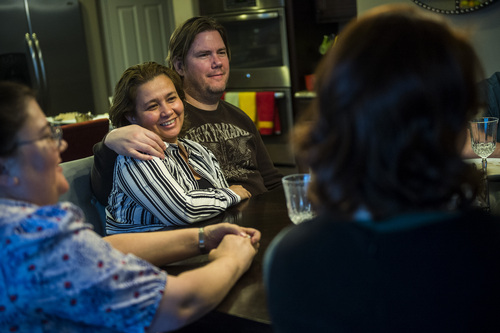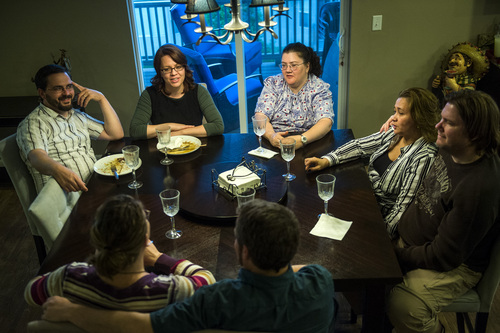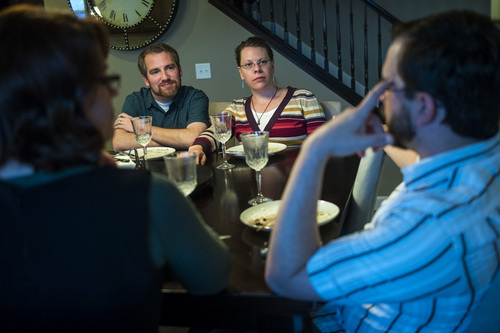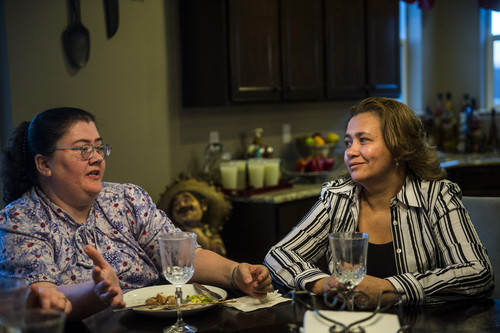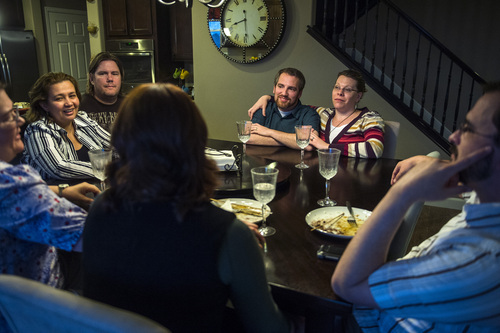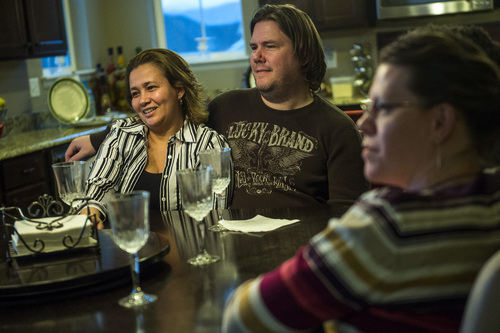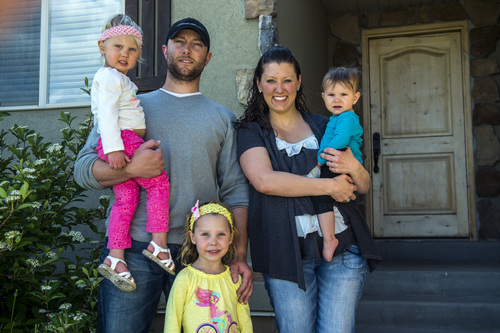This is an archived article that was published on sltrib.com in 2014, and information in the article may be outdated. It is provided only for personal research purposes and may not be reprinted.
To any guilt-prone women, the annual idealization of motherhood that sweeps across the country at this time of year can be agonizing.
The image in the mirror seems less qualified, less nurturing, less altruistic, less crafty, less organized, less patient, less self-assured or wise or adventurous than the one these moms see portrayed in greeting cards, TV ads, and on YouTube.
But Mother's Day may be most painful to Bible-believing women — whether Mormon, Catholic, Protestant or Jewish — who cannot have children.
After all, God's first commandment to the first couple in that holy book was to "multiply and replenish the Earth."
Motherhood, the LDS Church declared this week on its website, is "the highest, holiest service assumed by humankind. It's the definition of selfless service. It's both a daunting responsibility and a glorious opportunity. The divine role of motherhood is a gift from God, and key to his plan of happiness for all his children."
Biblical tales of "barren" women abound, but they all end up with babies (sometimes becoming mothers in their old age, but still...). And church magazines about infertility typically end with "miracle babies."
Nearly 11 percent of women in the United States ages 15 to 44 — 6.7 million — have "impaired fecundity" (impaired ability to get pregnant or carry a baby to term), according to the Centers for Disease Control and Prevention.
Some of them may eventually become mothers by marriage, medicine or adoption, but until then, many feel ashamed, frustrated and excluded. For others, childlessness becomes lifelong.
Is infertility, then, a failure of faith? A religious test? A shirking of sacred responsibilities? Or are churches wrong to hold up motherhood as the apex of a woman's life?
Regardless of doctrinal particulars or practice, many religious women facing childlessness go through a set of stages similar to any sort of grief — including denial, blame, anger, bargaining, depression and, finally, acceptance.
While churches can make it tough by discouraging medical procedures such as artificial insemination, in vitro fertilization or surrogacy, they also can offer solace for sorrow.
Infertile Catholics and Mormons, in particular, draw differing lessons from their faiths' pronouncements on the importance of motherhood.
To the former, there are many other visible ministries for women besides being a mom — nuns, many teachers and most female saints are single and childless.
To the latter, almost all role models are married with children.
That stigmatizes the childless, says Kristy Money Straubhaar, an LDS psychologist in Santa Monica, Calif., who specializes in infertility among her Mormon clients. "It can lead to depression and anxiety."
Not only do "you feel broken and that you've failed in the one most important calling you could ever do," says Straubhaar, who was infertile herself, but "you also feel alone."
The Utah-based faith teaches that "families are forever," stretching from Earth through eternity, which can make those without kids feel that they have somehow broken a link with heaven. But it also promises that those without offspring here will be given that opportunity in the hereafter.
For some, that is not much comfort.
Thus, infertility can lead to loss of faith, ending participation in the religious community.
Even for believers, it can make more sense to stay sequestered at home — or on a carefree vacation — than in a church pew on Mother's Day.
Breaking the mold • Orem resident Liberty (Libby) Sproat, reared by a single mom, was determined that hers would be the model Mormon life.
When Sproat married at 19, she planned to have a passel of children like her fertile siblings (she now has 42 nieces and nephews).
Sproat and her husband, Ethan, never used birth control, she says, and initially were unconcerned about not conceiving. Maybe God thought they were just too young.
Eventually, the couple went to a doctor to figure out what was wrong.
There were potential solutions. They tried fertility treatments, but reasoned if they were going to spend the money for in vitro — by some estimates, between $10,000 and $20,000 per attempt — they preferred to try adoption (equally expensive).
When two adoptions fizzled due to birth moms with changes of heart, they stopped.
"We prayed," Sproat says now, after being married nearly 16 years, "and got the answer that the Lord wanted us to do other things than have children."
In 2009, the couple "closed our adoption file," she says, "and embraced childlessness."
She sought support online, but found mostly resources for those still trying to have children and others who were "childless by choice."
So a year later, Sproat launched a website for those like herself, childlessmormonsupport.com, and soon found women with the same need.
Sproat took heart from a conversation with Ardeth Kapp, who once served as general president of the LDS Young Women's organization for girls between ages 12 and 17.
Kapp married but never had children.
"You are so lucky," Sproat recalls Kapp telling her. "You are going to find out what else is out there to do."
Now Sproat is finishing up her doctorate in history from Purdue University in Indiana and will be teaching at Orem's Utah Valley University in the fall.
"Teaching is a perfect profession for someone who cannot have children," she says. "I get to be an influence on young people — plus I get enough sleep at night."
Being childless permanently, she says, "does not mean you are not righteous or don't have enough faith."
Connecting with others • South Jordan resident Silvana Hoggan, a Mormon convert from Brazil who gave up trying to have kids after years of failed attempts, was one of the first to find Sproat's website. Now she is a fellow blogger there.
"People need to realize that these other [childless] women are fulfilling their lives, helping other people, nurturing kids and friends," Hoggan says. "Faith is important to us. We want to show that even without children, you have a reason in life. The Lord has a bigger plan for us even though we can't imagine at first what that is."
Roy resident Amanda Robinson also blogs with Sproat and Hoggan.
Robinson was so certain that she would be a mom when she married at 19, she didn't go to college.
After battling infertility for years, though, she has returned to school and hopes to become a junior high counselor. Currently, she works with students with disabilities.
"I was angry and blamed myself," Robinson says. "But I always knew God loved me, and he knew what was best for me."
For Salt Laker Corey Howard, infertility caused her to distance herself from the Mormon community.
Howard spent part of her early years of marriage believing she could not conceive because she did not wed in an LDS temple.
She still believes in Mormonism, she writes in an email, but is "taking a break from attending" services.
"There are realities associated with being LDS and a childless woman," she writes. "My opinions carry less weight without actual parenting experience, and, in general, women without children tend to he viewed as incomplete and stalled in their progression. They are then infantilized somewhat. Pity and furrowed brows are to be expected with new introductions."
Even those childless women who continue to be involved in Mormonism say they are often treated "like second-class citizens."
So why is it different for Catholics?
Models of pious women • Catholicism paints a no less-vaunted position for motherhood. The Holy Mother — Mary — is even more exalted among the faithful than in almost any brand of Christianity.
But she is joined by a host of single female saints, who became symbols of godliness held up as examples for all.
"In my mind, infertility never negatively affected my faith," says Vanessa Hecker, a Catholic woman in Magna who dealt with infertility for a few years. "In my mind, babies are blessing, not a right, and we are not all guaranteed that."
Hecker knew, she says, that "if we didn't get pregnant, that was what God had in mind."
Going to Mass never made her feel bad, the mom of three says.
"There are a lot of other ministries that help further the faith; there are other ways to funnel your energy."
That's what Sue Boerke, a teacher in the Granite School District, decided after a decade of marriage without children.
Devout Catholics, Boerke, and her husband, Matt, used natural methods and medicine to try to conceive for eight years without success.
The couple concluded that not having children "was God's will for us," she says. "Everyone has a cross to bear and ours was going to be infertility."
Instead of praying for kids, they prayed to know the divine purposes for themselves. They planned to pay off their house and take a long trip to Ecuador.
Then came a surprise: Baby Nora was born four months ago.
Though she adores her infant daughter, Boerke says, she would have been all right if the pregnancy had never happened.
"Being a mom is not the end all, be all; it is not the ultimate way to be closer to God," she says. "My life's happiness did not depend on having a child. Otherwise, it consumes you."
Mormon immigration attorney Rebecca van Uitert, who lives in Chicago, knows all about being consumed by infertility.
Seeking other voices • Van Uitert once was seated next to an Orthodox rabbi on an airplane, when the man innocently asked how many children she had.
Van Uitert burst into tears and continued to sob, she writes in an email. She finally regained her composure and asked him how the infertile are viewed within Judaism.
"We tell the women in our temple that having children is a very, very important thing to do," she recalls him saying. "But we also tell the women that if they cannot have children, for whatever reason, it means that God has something even more important for them to do. ... It is obvious that God has deliberately taken from them their ability to have children for a good reason. We then encourage them and nurture them on their quest to discern what it is that they are supposed to dedicate their lives to instead."
The rabbi's words proved comforting, the Mormon wife writes, because it was "the first time I realized that maybe there is something more important for me (personally) to do in this life than have children."
And maybe God planned it all this way.
That seems, to van Uitert, like a perfect Mother's Day sermon: "Cultivate a connection with deity above all other goals."
pstack@sltrib.com Twitter: @religiongal —
Advice for loved ones of childless couples:
• Don't assume or suggest that life without children must be "blissful" and "easy."
• If a couple say they have no children, don't ask "why not?" or presume they have no experience with children.
• Don't ask: Have you thought about adopting?
• Don't be offended by the couple's lack of interest in conversations "dominated by anecdotes of pregnancy, labor and delivery, breast-feeding, sleeping habits, toilet training.
• Don't presume the couple want to "lavish affections on your baby or children — not everyone loves your child as much as you do."
• Don't try to "fix the situation, or even assume that the situation is one that needs to be fixed." Be comfortable with other people's childlessness — such couples "are looking for a friend, not a doctor."
• Don't offer unsolicited advice about how to become pregnant.
Source: childlessmormonsupport.com


